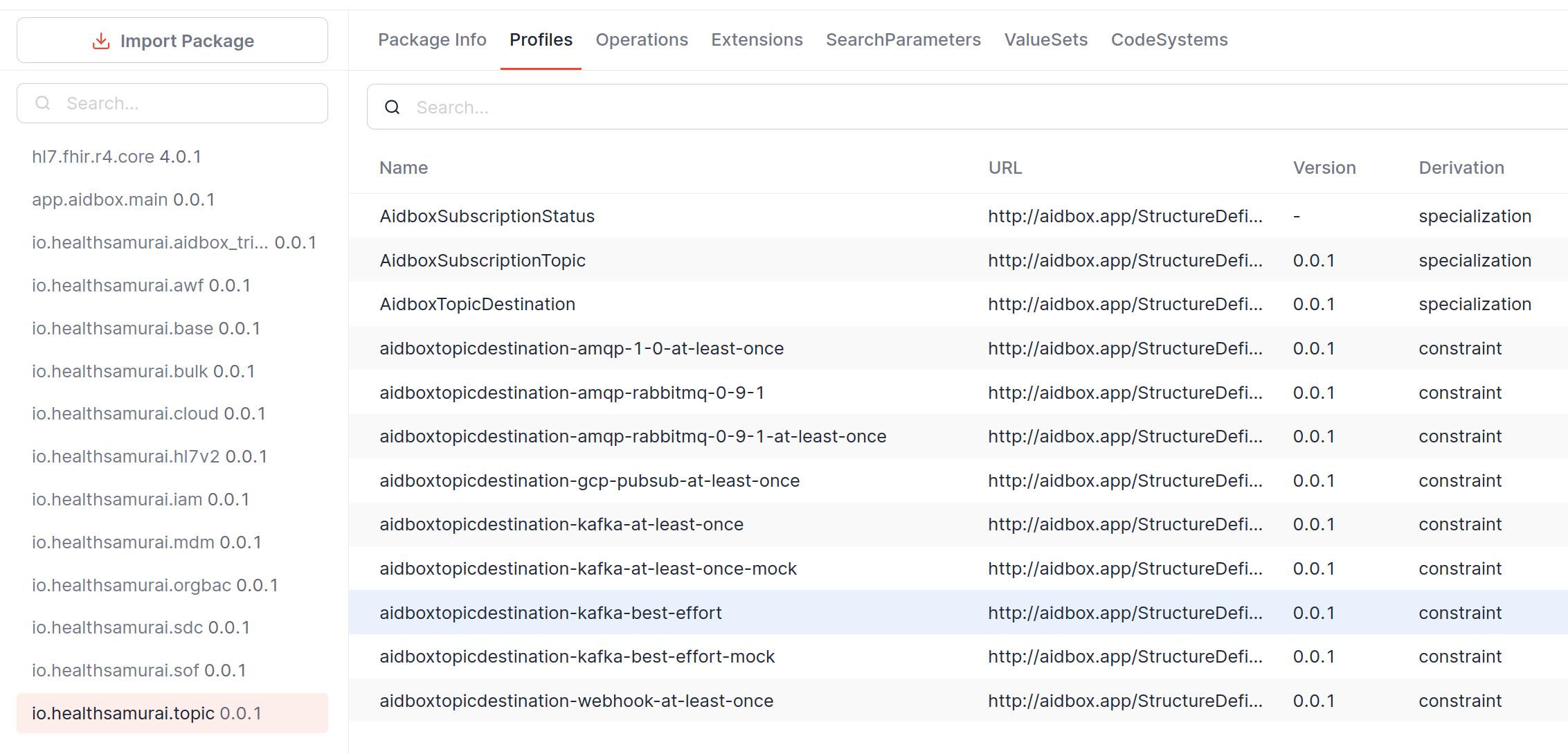AidboxTopicSubscription RabbitMQ tutorial
Connect Aidbox subscriptions to RabbitMQ message broker using AMQP protocol for real-time FHIR event processing.
Objectives
- Learn how to integrate AidboxTopicSubscriptions with RabbitMQ using AMQP protocols
Before you begin
- Make sure your Aidbox version is newer than 2504
- Setup the local Aidbox instance using getting started guide
What is RabbitMQ?
RabbitMQ is a reliable and mature messaging broker that implements the Advanced Message Queuing Protocol (AMQP). It provides robust message delivery, routing capabilities, and supports various messaging patterns including publish/subscribe, request/reply, and point-to-point communication.
RabbitMQ natively uses AMQP 0-9-1 protocol and also supports AMQP 1.0 (since RabbitMQ 4.0 without plugins). In Aidbox, you can use both protocol versions, the tutorial uses version 1.0.
Setting up
- 1.
Add rabbitmq service to docker-compose.yaml from getting started guide:
rabbitmq: image: rabbitmq:4-management environment: RABBITMQ_DEFAULT_USER: admin RABBITMQ_DEFAULT_PASS: admin ports: - "5672:5672" # AMQP port - "15672:15672" # Management UI port - 2.
Download .jar AMQP module file from our bucket and place it next to docker-compose.yaml.
curl -O https://storage.googleapis.com/aidbox-modules/topic-destination-amqp/topic-destination-amqp-2509.4.jar - 3.
Add jar module file to Aidbox:
volumes: # module jar to turn on AMQP support - ./topic-destination-amqp-2509.4.jar:/topic-destination-amqp-2509.4.jarSet envs to import it on start:
BOX_MODULE_JAR: "/topic-destination-amqp-2509.4.jar" BOX_MODULE_LOAD: io.healthsamurai.topic-destination.amqp.core - 4.
Start the services.
docker compose upNow, in AidboxUI, go to FHIR Packages -> io.healthsamurai.topic and make sure that AMQP profiles are present.

Basic usage with AMQP 1.0
- 1.
Access RabbitMQ Management UI at http://localhost:15672 (login: admin/admin).
- 2.
Create a queue in RabbitMQ Management UI:
- Go to Queues and Streams tab
- Click Add a new queue
- Name:
patient-events - Type: Classic
- Durability: Durable
- Click Add queue
- 3.
Go to AidboxUI and create a topic that triggers if
Patient.nameexists.POST /fhir/AidboxSubscriptionTopic content-type: application/json accept: application/json { "resourceType": "AidboxSubscriptionTopic", "url": "patient-topic", "status": "active", "trigger": [ { "resource": "Patient", "fhirPathCriteria": "name.exists()" } ] } - 4.
Create AidboxTopicDestination with AMQP 1.0 profile.
POST /fhir/AidboxTopicDestination content-type: application/json accept: application/json { "id": "rabbitmq-destination", "resourceType": "AidboxTopicDestination", "meta": { "profile": [ "http://aidbox.app/StructureDefinition/aidboxtopicdestination-amqp-1-0-at-least-once" ] }, "kind": "amqp-1-0-at-least-once", "topic": "patient-topic", "parameter": [ { "name": "host", "valueString": "rabbitmq" }, { "name": "address", "valueString": "/queues/patient-events" }, { "name": "username", "valueString": "admin" }, { "name": "password", "valueString": "admin" } ] }
Testing the integration
- 1.
Create a patient with a name.
POST /fhir/Patient name: - family: smith - 2.
Check the message in RabbitMQ Management UI(http://localhost:15672 ):
- Go to Queues tab
- Click on
patient-eventsqueue - You should see 1 message in the queue
- Click "Get messages" to view the content
The message will be base64-encoded and contain:
{ "topic": "patient-events", "value": { "resourceType": "Bundle", "type": "history", "timestamp": "2025-09-23T10:19:32Z", "entry": [ { "resource": { "resourceType": "AidboxSubscriptionStatus", "status": "active", "type": "event-notification", "notificationEvent": [ { "eventNumber": 1, "focus": { "reference": "Patient/f1181c9b-09a3-474f-800e-ed4ac6bae444" } } ], "topic": "patient-topic", "topic-destination": { "reference": "AidboxTopicDestination/rabbitmq-destination" } } }, { "request": { "method": "POST", "url": "/fhir/Patient" }, "fullUrl": "http://localhost:8080/fhir/Patient/f1181c9b-09a3-474f-800e-ed4ac6bae444", "resource": { "name": [ { "family": "smith" } ], "id": "f1181c9b-09a3-474f-800e-ed4ac6bae444", "resourceType": "Patient", "meta": { "lastUpdated": "2025-09-23T10:19:32.612898Z", "versionId": "19", "extension": [ { "url": "https://aidbox.app/ex/createdAt", "valueInstant": "2025-09-23T10:19:32.612898Z" } ] } } } ] } }
Monitoring
Check the status of your topic destination:
GET /fhir/AidboxTopicDestination/rabbitmq-destination/$status
Response will include metrics:
{
"resourceType": "Parameters",
"parameter": [
{
"name": "messagesDelivered",
"valueInteger": 1
},
{
"name": "messagesInProcess",
"valueInteger": 0
},
{
"name": "messagesQueued",
"valueInteger": 0
},
{
"name": "messagesDeliveryAttempts",
"valueInteger": 0
},
{
"name": "status",
"valueString": "active"
},
{
"name": "startTimestamp",
"valueString": "2025-05-05T09:54:29Z"
}
]
}
Troubleshooting
Connection issues
If you see connection errors:
- Verify RabbitMQ is running:
docker compose ps - Check RabbitMQ logs:
docker compose logs rabbitmq - Ensure the host parameter matches your RabbitMQ service name or IP
Authentication failures
If you see authentication errors:
- Verify username/password in AidboxTopicDestination parameters
- Check user permissions in RabbitMQ Management UI
- Default Docker setup uses admin/admin
Messages not delivered
If messages aren't appearing in queues:
- Check Topic Destination status:
GET /fhir/AidboxTopicDestination/{id}/$status - Verify queue exists in RabbitMQ
- Check exchange bindings if using exchanges (AMQP 0-9-1 only)
- Ensure subscription topic is active and matches your resource criteria
Last updated: